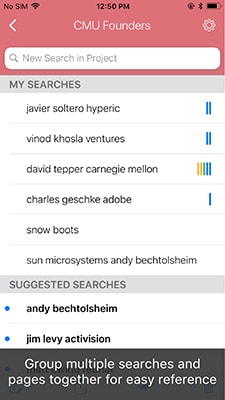
Bento Browser Makes it Easier To Search on Mobile Devices
Eliminates "tab overload" associated with traditional browsers
Searches involving multiple websites can quickly get confusing, particularly when performed on a mobile device with a small screen. A new web browser developed at Carnegie Mellon University now brings order to complex searches in a way not possible with conventional tabbed browsing.

The Bento Browser, inspired by compartmentalized bento lunch boxes popular in Japan, stores each search session as a project workspace that keeps track of the most interesting or relevant parts of visited web pages. It's not necessary for a user to keep every site open to avoid losing information.
"With Bento, we're structuring the entire experience through these projects," said Aniket Kittur, associate professor in the Human-Computer Interaction Institute (HCII). The projects are stored for later use, can be handed off to others or can be moved to different devices. "This is a new way to browse that eliminates the tab overload that limits the usefulness of conventional browsers."
Someone planning a trip to Alaska with a conventional browser, for instance, might create multiple tabs for each location or point of interest, as well as additional tabs for hotels, restaurants and activities. With Bento, users can identify pages they found useful, trash unhelpful pages and keep track of what they have read on each page. Bento also bundles the search result pages into task cards, such as accommodations, day trips, transportation, etc. The project could be shared with other people planning their own trips.
Kittur's research team will present a report on their mobile web browser at CHI 2018, the Conference on Human Factors in Computing Systems, April 21-26 in Montreal, Canada. A research version of the Bento Browser for iPhones is available for download from the App Store.
Mobile devices now initiate more web searches than do desktop computers, yet the limitations of conventional browsers become more acute on mobile devices. Not only is screen size limited, but mobile users are more often interrupted and have more difficulty saving and organizing information, said Nathan Hahn, a Ph.D. student in HCII.
In user studies that compared Bento with the Safari browser, users said they preferred Bento in cases where they wanted to continue a search later and wanted to pick up where they left off. They also said Bento kept their searches better organized. Though most participants found it easier to learn how to use Safari, they found Bento more useful for finding pages and believed that Bento made their mobile searches more effective.
One goal was to design Bento to work in a way that complements the way the mind works.
"If we get a lot of people using it, Bento could serve as a microscope to study how people make sense of information," Kittur said, noting people who use the research version are asked to consent to their searches becoming part of the research data. "This might lead to a new type of artificial intelligence," he added.
Bento Browser is now a search app for iPhones, but its capabilities for organizing searches and helping people resume searches also could benefit people using desktop computers. To accommodate those users, Kittur's team is now preparing a Bento plug-in for the Chrome browser.
Joseph Chee Chang, a Ph.D. student in CMU's Language Technologies Institute, is part of the Bento team and a co-author of the CHI paper. More information is available at bentobrowser.com.